During the very first session with all of my clients I ask, “what do you want?” and I am no longer surprised by how often people struggle to answer what seems like a simple question. Most know very well and can describe in detail what they do not want but describing what they want is a challenge and for some it’s near impossible (and I was once firmly in this boat and if I’d been pushed to come up with my highest health hopes I don’t think I’d have conceived of anything grander than “out of hospital” or “alive”).
When I look around it’s not too hard to see why we struggle to describe how we want to experience our health as opposed to how we don’t want to experience our health. There is monumental external emphasis on the avoidance of illness and disease what exactly it is we’re striving for in place of illness and disease is far less clear. Do you have an idea of what you want in place of illness and disease? I mean if you really take a moment to think about it, if you were free from illness, disease (and all financial or power struggles too of course) what is it you want to experience in life?
I am so hoping you came up with something which involved happiness! Something which involves great mental health and feeling happy because good mental health and happiness are about so more than the absence of mental health illness and you don’t have to have any mental health problems at all to make good mental health and happiness a daily priority. Which brings us to the topic of this week’s post food and mood because one of the very real and very useful tools we have within our power to use as a means of enhancing and supporting our best mental health, happiness and enjoyment is food! Not in the way of what you “should” avoid eating to avoid illness but in the way of what you can add in to promote happiness!
How To Build A Human

Everything that goes on within your body depends in some way on something you once put into your mouth. The process goes something like this you eat foods, they get broken down, absorbed and then essentially reassembled into human pieces to create you and everything you need to continue being a human and this process continues day in and day out without pause. On top of this the foods you eat over the course of any given day contain thousands of compounds each of which have the potential to influence your brain function. It is this interplay between what you eat and what you feel which is the focus of this post because this is super important (and super exciting).
What You Will Get Out of This Post

After reading this post you will understand clearly the direct links each of the 3 macros have on your mental health and happiness as well as one key vitamin, one key mineral and another major food component recently gaining interest as a promotor of happiness bam bam bam continue reading to discover what it is and what foods to eat to super charge your brain function, mental health and happiness… (ok so I may have had more than a good dose of these nutrients this weekend and I apologise for the addition of typed sound effects and I hope your brain has the capacity to translate them to a level close to the funniness in which they occurred in my mind as I typed them and if not may the force be with you for the remainder of this post. Ps. feel free to skim out the information because there’s gold here).
Why is Happiness Even Important?

As you’ve probably gathered by now, I love having a million and one scientific studies to back up any points I make however, I’m not going to lie I struggled to find concrete research between food and happiness. Not because the link doesn’t exist but because there simply isn’t too many studies on it. It was much easier to find research into nutrition and mental illness but what I really wanted to share with you was eating for happiness. Not just eating to prevent, manage or cure mental illness because while this is also important happiness has merit in its own right and to me health is so much more than the absence of mental illness!
Why am I so keen on mental health and happiness as health priorities in their own right? Those who experience what’s formally referred to as “more positive emotions” live longer than those who ahem don’t1. Feel good, be more productive and probably live longer too why on earth not!?
The World Health Organizations definition of mental health is: “Mental health is the state of well-being in which the person can realise their potential, cope with normal stresses of life, work productively and fruitfully and contribute to the community”2. How great is that? It is literally my mission in life to help create a meaningful world people are proud to be a part of and mental health and happiness are definitely key to the daily work of continuing to bring that passion to life.
What Foods Fuel Happiness?
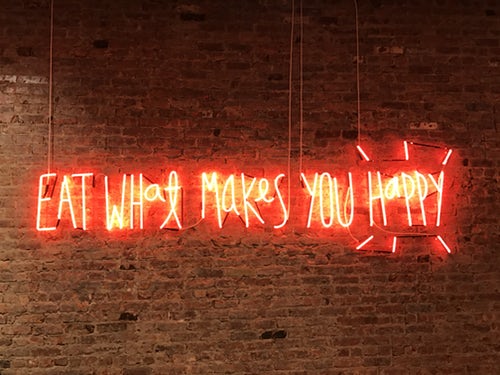
It is the macros (carbs, fats and protein) which have by far the largest effect on your mental energy and function.
It doesn’t matter how many supplements you take (natural, organic, synthetic, artificial or otherwise), how many “superfoods” you seek, how much organic kale juice you consume (or is that celery now I’m still confused on the celery thing?..) if you’re not first meeting your body’s needs for the macros you’re not going to feel good. Period. Why? Because before anything else your brain needs fuel and the macros are the nutrients which give it fuel (in particular glucose from carbs).
If your brain doesn’t have an ample supply of fuel there is no way you’re going to be in a good mood because you’re brain can’t function properly and it also can’t make any of the neurotransmitters needed to feel good (for example serotonin, dopamine, oxytocin, acetylcholine or norepinephrine).
Let’s quickly touch on the 3 macros and some of their specific mood enhancing effects.
Fats
Your brain is 60-70% fat. Need I say more?… Clearly when it comes to your optimal function including your mood fat is important because your brain is the part of you which creates your mood. We know the really great fats for your brain health are the omega 3 fats and lack of omega 3 fats have been associated with irritability, depression and low mood3. Omega 3 fats are found in good amounts in nuts, seeds and fatty fish.
Protein
When you eat foods rich in protein the protein is broken down into its subcomponents called amino acids (AAs). These AAs are the precursors for your neurotransmitters (the substances produced in your brain which send messages around your nervous system). If you have a lack of any of these neurotransmitters your brain function and mood will be compromised.
As just one example the neurotransmitter serotonin more commonly referred to as “the happy hormone” (I’ll let you figure out what effect it has on your mood) is made from the AA tryptophan. Low tryptophan means low serotonin and low serotonin has been linked to depression. In fact, this is what the antidepressant drugs known as SSRIs primarily target. Tryptophan (and AAs in general) are found in good amounts in salmon, poultry, eggs, milk, chocolate, nuts and seeds.
Carbs
If I could give one recommendation to the majority of people, I work with it would honestly be to eat more carbs. Why? Oh, so many reasons which we don’t have time to cover here however with relation to mood an adequate and consistent intake of healthy carbs is for many a game changer. I support any and every conceivable diet there is on the planet and any way you can imagine to eat however the one caveat is that you have to honestly experience in your heart of hearts that whichever way you choose to eat is not holding you back compared to another way you could be eating… and truly when it comes to the majority of people I work with a very low carbohydrate intake is not fuelling their best health (mental or physical) even if it is with the utmost noble intentions that it do so.
Your brain uses 20-25% of all your daily energy intake which is a huge demand (especially when you consider your brain accounts for only about 2% of your overall body weight) and it is glucose (from the carbs you eat) which is your brains most favourite and preferred fuel source. We know very well that blood glucose levels (BGLs) influence how you feel and when your blood glucose levels are low concentration is hard, you get hangry and irritable and this is when many people begin to intensely crave sweet foods.
When you’re low in glucose or nutritionally depleted it is the prefrontal cortex which is the first to suffer and because this is the most evolved, most feeling, most rational part of your brain most associated with joy and creativity the effects this has on mood are huge. When people were fed diets containing low, medium or high levels of carbs the low carb dieters were more likely to report being angry, depressed and tense than the other groups4 and people who eat diets higher in carbohydrate have been shown to have lower rates of depression or poor mood5.
Hence why you need to fuel up with decent amounts of carbohydrate and in particular carbohydrates that are slow releasing or paired with the other macros to slow down their digestion and absorption and maintain BGLs and thereby bring consistent joy and playfulness into your life.
Some Extra Plugs for Carbs and Mood (Because Someone’s Got to Be on Team Carbs!)
There’s more to the process of converting tryptophan (one of the AAs) to serotonin this also requires a number of other nutrients including the B vitamins in particular B6 (pyridoxine) of which many carbs provide a great source and there’s more one of the metabolites (things produced by the breakdown of other things) of carbs called acetyl-coA is essential for the production of another neurotransmitter called acetylcholine. Guess what acetylcholine is great for? You probably got it alertness and focus both of which clearly are important to maintaining a good mood.
Carbs which are digested more slowly and provide higher levels of micronutrients are generally associated with higher health outcomes for people where they make up the majority of their carb intake. These include wholegrains (for example brown rice, oats, whole wheat bread, barley and pasta, quinoa), legumes, potato, sweet potato and corn and most fruits. As well as this mixing carbs with the other macros can further slow absorption. Which means if you notice your happiness peaks and crashes after sugary foods you may like to pair those foods with fats and/or protein for example add some peanut butter to your jam toast or have a handful of nuts with your chocolate.
Micronutrients of Happiness
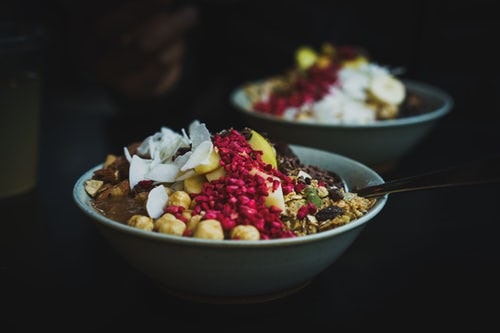
It would be a little silly to try to pinpoint any exact micronutrients to eat for happiness above others because they all play a role, they all work together and interact in myriad ways which work best when you have a great supply of all. Some of the key players identified to be important in regulating mood and happiness include vitamin B12, iron, vitamin D, iodine, copper, zinc, selenium, sodium, folic acid and magnesium.
Two Major Micronutrients of Happiness Plus Revealing the Mystery Food Component
I’m only going to briefly go into a little more detail on just two of the micronutrients here as well as quickly introduce a whole new array of food compounds (flavonoids) so you get an idea of the diverse ways in which not only the macros, vitamins and minerals but also additional food components influence your mental health and happiness.
Vitamin B12
Vitamin B12 (or cobalamin) might not be a commonly thought of nutrient when it comes to mental health and happiness however it is super important to brain health. Your nervous system needs B12 to produce the neurotransmitter serotonin and a number of studies show that getting good to high doses of B12 may prevent low mood and depression.
Foods to Eat to Up Your B12 Intake
Animal foods contain B12 including:
- Beef, fish, chicken
- Eggs
- Diary (milk, cheese, yoghurt)
If you don’t eat animal products it is recommended you take a vitamin supplement containing B12.
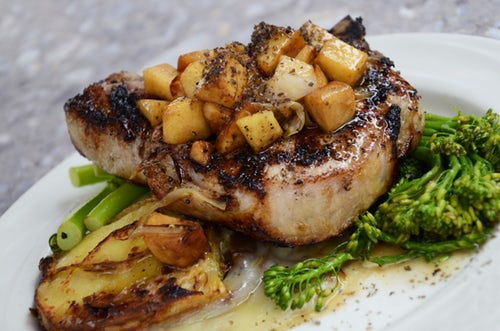
Iron
Iron is the central component of the haemoglobin molecule found in red blood cells (RBCs). RBCs are the cells responsible for transporting oxygen all throughout your body including to your metabolically active brain cells. If you’re not getting enough oxygen to your brain, you’re going to feel less than perky and iron deficiency is well known to be associated with symptoms such as tiredness and apathy neither of which are states which spark happiness.
Foods to Eat to Up Your Iron Intake
- Meat (beef, fish, chicken)
- Eggs
- Diary (milk, cheese, yoghurt)
- Legumes
- Nuts and seeds
- Dried fruit (dried apricots)
- Green leafy vegetables
- Wholegrains (brown rice, quinoa, wholegrain wheat bread)
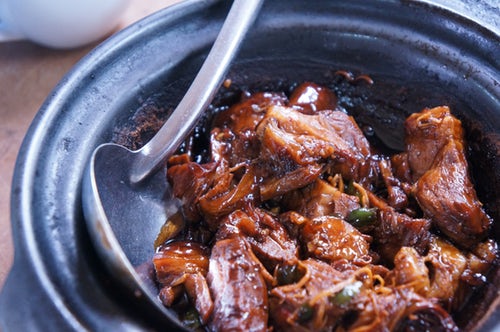
Flavonoids
Flavonoids fall under neither the macro or micro category and are simply compounds found within various plant foods. Flavonoids are associated with a broad spectrum of health promoting benefits including improved brain function and happiness both in the short and long term after eating foods rich in flavonoids. One of the theories by which flavonoids increase brain function and happiness is that they activate enzymes responsible for increasing blood flow to the brain which increases the inflow of nutrients and oxygen and because nutrients and oxygen is what your brain wants there’s a clear benefit to this on mood.
Foods to Eat to Up Your Flavonoid Intake
- Dark chocolate (cacao)
- Grapes (and yes red wine)
- Berries
- Green tea
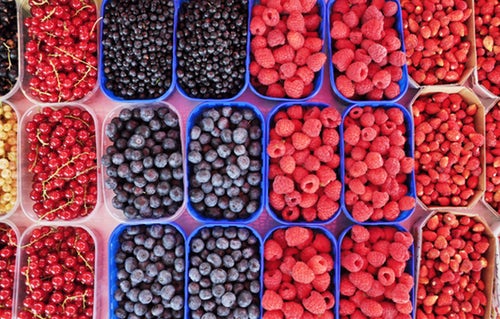
Take Home Points

Food is by no means the only thing which helps improve your mood or the sole determinant of your happiness. Sorry to be the one to break it to you but if you’re partner’s a butt, you broke your leg at a time when the surf’s never looked so good or your pet rock just died changing your diet isn’t going to cure all your mood challenges… However, all else aside what you eat has an irrefutably large impact on your mood, energy, vitality and enjoyment of life. Why? because you are literally made of food. What you eat certainly lays the foundation of what is possible because at the end of the day, we are biological beings. Which means that everything you do, think and feel is in part influenced by what you eat.
What you eat has an impact over your brain and mood not just in the short term (as we most commonly think of when we’re reaching for the sugary pick me up snacks) but also the long term. The major component of making sure you are in a good mood is making sure you are consistently eating enough energy. You must have a great and regular supply of energy to fuel your brain if you want to come close to experiencing any level of consistent enjoyment, playfulness, creativity and happiness.
On top of this specific neurotransmitters involved in all the feel-good feelings (including serotonin and acetylcholine) require not just macros but micronutrients as well for their satisfactory production (for example serotonin requires the amino acid tryptophan from the breakdown of protein as well as vitamin B12 for its synthesis). The moral of the story? If your body doesn’t receive the macros and micros in sufficient amounts, it’s simply not going to produce enough of the stuff you need to feel good. So, get munching.
Don’t cut out foods, food groups or food components unnecessarily and eat regular variety-filled meals with mixes of fats, carbs and protein to ensure your blood glucose levels are maintained and your brain is supplied with all the glucose, micronutrients and extra stuff (including flavonoids) it needs to not stress, to focus on happiness and be soothed and safe to be creative and generous. That’s fun!
With my whole heart I trust you found this information useful and inspiring
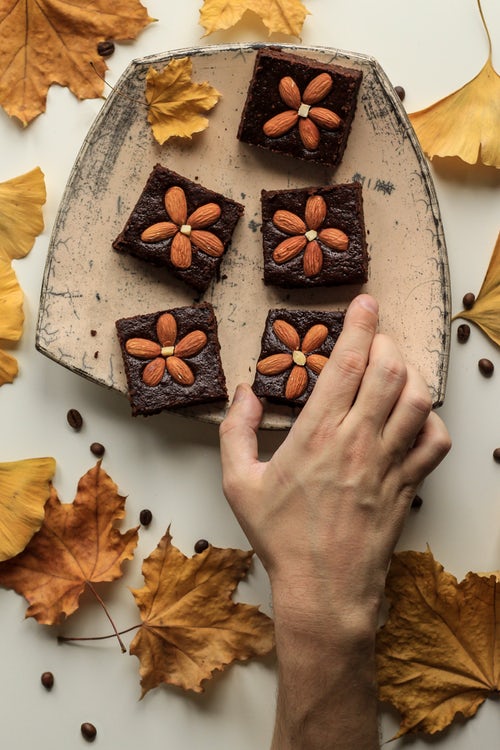
Become Great. Live Great.
Bonnie.
Reference
- Danner D, Snowdon DA and Friesen WV. “Positive emotions in early life”. Journal of Personality and Social Psychology. 2001:80; 804-13.
- World Health Organization 2012. Health topics: Mental health. Available online: http://www.who.int/topics/mental_health/en/.
- Ross B. “Omega 3 fatty acid deficiency in major depressive disorder is caused by the interaction between diet and a genetically detrmined abnormality in phospholipid metabolism”, Medical Hypotheses. 2017: 68(3);515-24.
- de Castro JM. Macronutrient relationships with meal patterns and mood in spontaneous feeding behavior of humans. Physiol Behav. 1987;39:561-569.
- Keith RE, O’Keefe KA, Blessing DL, Wilson DG. Alternations in dietary carbohydrate, protein and fat intake and mood state in trained females cyclists. Med Sci Sports Exerc. 1991;23:212-216.
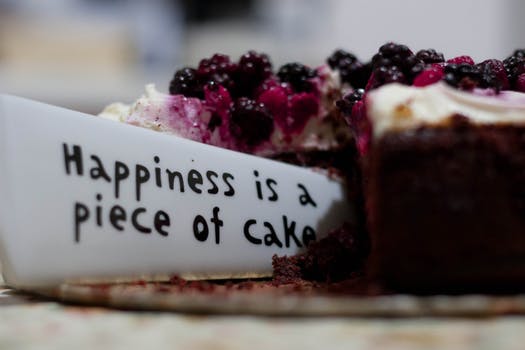



2 thoughts on “Mood and Food: A Dietitian’s Quick Tips on How to Eat for Happiness”
Thank you for the sensible critique. Me & my neighbor were just preparing to do some research about this. We got a grab a book from our local library but I think I learned more from this post. I’m very glad to see such wonderful info being shared freely out there.
Thank you 🙂